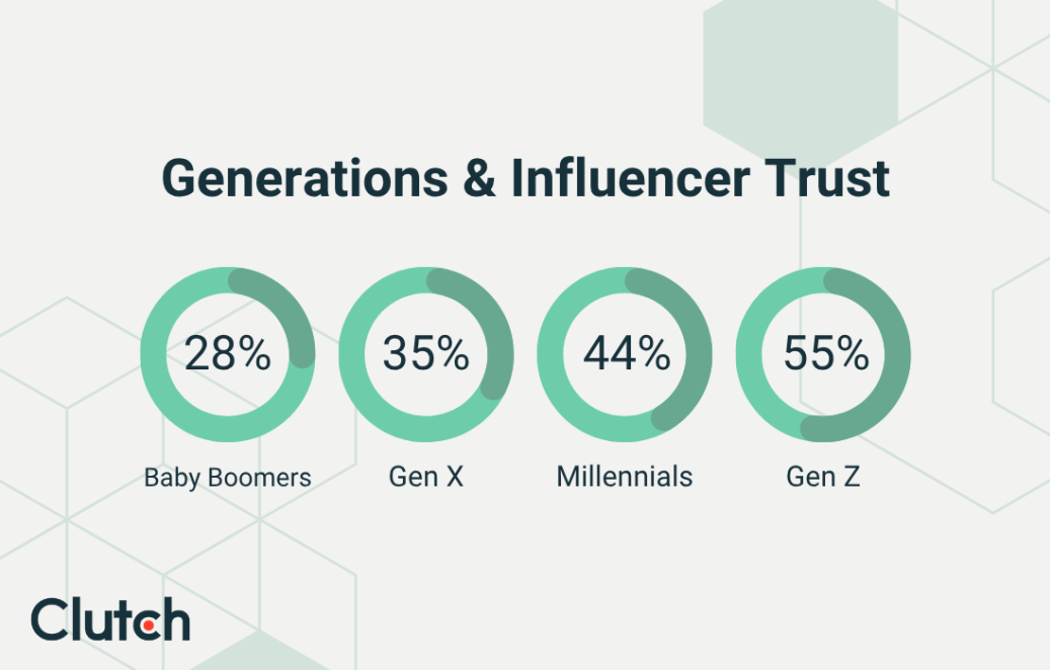New data suggests consumers are losing confidence in social media influencers, with generational divides shaping how online endorsements are received. The survey, conducted in June 2025 with 277 U.S. adults, shows that trust in influencers is uneven and often tied to age and platform habits.
Generational Patterns
Gen Z stood out as the group most likely to believe influencer recommendations, with 55 percent saying they trust such content. Millennials followed at 44 percent, while Gen X recorded 35 percent. Baby Boomers showed the lowest trust at 28 percent. The gap means younger adults are almost twice as likely as older groups to take influencer advice seriously.
These numbers reflect broader media habits. Gen Z, raised in an environment shaped by YouTube, TikTok, and Instagram, often sees influencers as part of everyday peer circles. Boomers and many in Gen X, by contrast, still rely more on television, newspapers, or word-of-mouth reviews. For them, social media posts often look like paid promotions rather than genuine product use.
Decline in Purchases From Recommendations
The survey, conducted by Clutch[1], also confirms a shift in behavior. Nearly half of respondents said they had not bought any product endorsed by influencers in the last twelve months. Two years earlier, a majority had acted on such promotions. This decline shows how consumer expectations have changed.
Oversaturation of sponsored content is one likely factor. Users are regularly exposed to promotional posts, which can create fatigue. Another factor is transparency. Paid partnerships raise doubts, and 53 percent of respondents said knowing an influencer was paid makes them less likely to trust the endorsement. Yet, at the same time, 87 percent still believe influencers have used the products they recommend. The tension suggests that trust depends more on perceived intent than on product knowledge.
Platforms and Reach
Influencer activity is most visible on visual platforms. About 61 percent of respondents said they most often encounter recommendations on YouTube, TikTok, Instagram, or Pinterest. YouTube remains the most trusted for detailed reviews and demonstrations, while TikTok is influential among younger users seeking quick and entertaining clips. Instagram continues to drive lifestyle branding, and Pinterest holds its place for inspiration-driven categories like fashion, home, and DIY.
Divided Views on Credibility
The survey shows no consensus on whether influencers are more reliable than brands. Forty-one percent of respondents said they were unsure, a result that highlights the difficulty of establishing trust in today’s digital marketplace. Many consumers remain undecided, questioning whether endorsements from individuals or companies carry more weight.
A notable trend is the rise of micro-influencers. About 20 percent of respondents said they prefer recommendations from accounts with follower counts between 10,000 and 100,000. These smaller voices are often considered more approachable and relatable than large celebrity-style figures with millions of followers.
Implications for Brands
The findings reflect an evolving landscape. Highly polished influencer campaigns that once drew quick attention no longer guarantee results. Younger audiences still see influencers as part of their decision-making process, but older groups are less responsive and often skeptical of commercial motives.
For brands, the message is clear. Long-term partnerships with influencers, combined with transparent communication, are more likely to build credibility than one-off sponsored posts. Choosing the right platforms and understanding generational preferences has become central to strategy.
Trust remains fragile. It can decline quickly when audiences sense inauthenticity, but it can also be reinforced when influencers and brands deliver consistent, honest engagement. As influencer marketing matures, credibility rather than reach may determine which campaigns succeed.
Notes: This post was edited/created using GenAI tools.
Read next: AI Moderation Systems Clash on What Counts as Hate Speech[2]
References
- ^ Clutch (clutch.co)
- ^ AI Moderation Systems Clash on What Counts as Hate Speech (www.digitalinformationworld.com)


